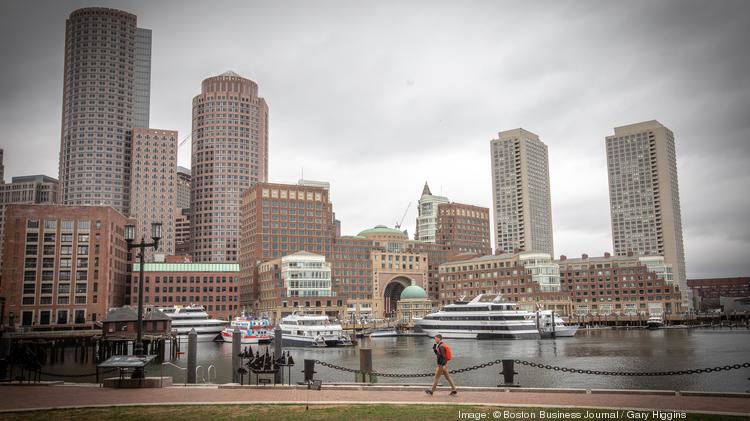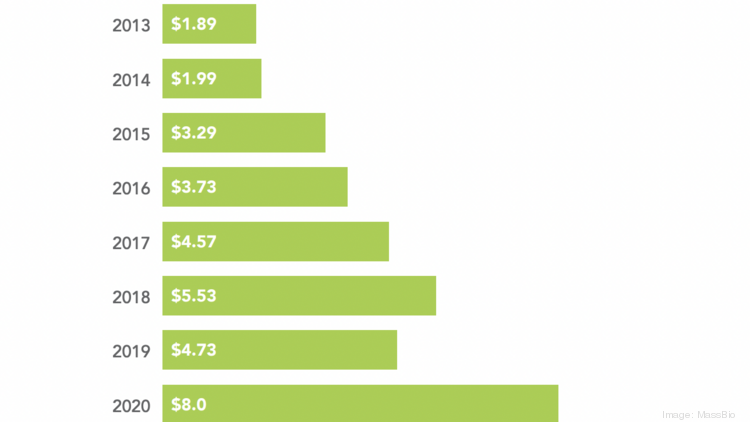The life sciences sector continued to grow in the Bay State last year, adding another 12,000-plus workers and nearly 16 million square feet in real estate between 2020 and 2021.
That’s according to a new report from the Massachusetts Biotechnology Council, the trade group better known as MassBio.
In 2021, biopharma employment in Massachusetts grew by 13.2%, reaching 106,679 people, according to the organization’s annual “industry snapshot.” That’s up from 94,266 the prior year. (MassBio adjusted the way it counted biopharma employees for this report, resulting in an increase of about 10,000 employees counted for 2020.)
Sourcing from multiple reports, MassBio expects between 26 million and 59 million square feet of lab and manufacturing space to come online across the state by 2025. At present, Massachusetts is home to 55.9 million such square feet, up from 40 million last year.
MassBio predicted last year that life sciences would add another 40,000 jobs by 2024. Despite industry-wide headwinds, which have resulted in layoffs and fewer IPOs, among other metrics, CEO Joe Boncore believes the growth is slated to continue.
But other challenges are looming — ones that have more to do with planning and development policy than the industry itself.
“The biopharma workforce and real estate… I think these are both positive signs that we’re maintaining our global leadership in life sciences innovation,” Boncore said. “Bigger statewide issues, like housing and the failing transportation system, present a real and present danger and are going to have to be things we work with the legislature on in the coming years.”
Boncore was himself a state legislator until last year, when he joined MassBio. During his time in the Legislature, he chaired both the joint committee on transportation and the joint committee on housing, spearheading policy to enable the creation of 135,000 new housing units by 2025. Now, he envisions a more robust goal: 400,000 new housing units by 2040, plus statewide legalization of accessory dwelling units.
Boncore and his peers are hoping to avoid allowing the life sciences industry to become a tool of gentrification. The sector’s average annual wage is $201,549, and while the Covid-19 pandemic has accelerated investment into companies like Moderna Inc. (Nasdaq: MRNA), those dollars have in several cases funneled directly into residential real estate.
The investment will have ripple effects throughout the region.
Total VC funding to Massachusetts-headquarter biopharma companies, in billions
According to MassBio’s report, 57% of venture capital funding went to companies located outside of Cambridge last year, up from 42% in 2020. Altogether, the industry took in $13.66 billion in VC money last year.
Massachusetts companies collectively raised $5.1 billion in the first half of 2022. It’s unlikely at this point that the state will shatter funding records again by the end of the year, but the report’s authors point out that $5.1 billion is already higher than the amount raised during all of 2019, before the pandemic bump.
Altogether, Massachusetts companies accounted for about 26% of the country’s life sciences venture capital investment, and about 38% of all IPOs in 2021.
“Obviously, the pandemic played an outsize role in the success of this industry, but if you look pre-pandemic we had about $4.7 billion of venture capital,” Boncore said. “There’s dry powder out there, and I think that’s just really good for the industry, and it’s really good for patients. Massachusetts companies, what we’re working on is the toughest science and getting results, and getting venture capital shifted this way.”



